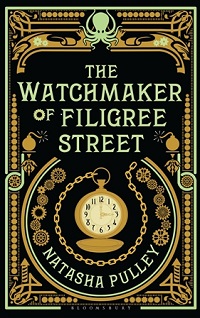I'm terrible at structure, let’s be clear about that. Whenever I have an editorial meeting, it’s always the same: ‘I love it! Change all the words, none of these ones make any sense.’ It’s the hardest thing about writing. I've got ideas, some of which are good, I can see the characters clearly, I love research, but that it should all go together in a sensible order is, as far as I'm concerned, an idea that belongs in the same circle of hell as Self Assessment tax and Jacques Derrida.

Two things, though, help. The first is Occam’s Razor. The simplest explanation is usually the best; there’s no reason to bring in a great many overcomplicated lines of reasoning and looping sidetracks when it’s possible to be concise.
In fiction, if a thing is more complicated than it has to be — if there are two characters where there could be one, if there’s backstory that doesn't actually matter — it looks cluttered. Fiction has to be far more streamlined than fact, because it must be more believable than fact in order to be believed at all. When I was in creative writing workshops, it was invariably the real stuff that everyone thought was ridiculous. One lady wrote about a Romanian man who lived unbeknownst to the main character in her shed for many months: true. I once got into a scrap about including in a story a substance that was designed to control the weather in Victorian London, because, even though everyone could swallow a clockwork octopus, weather manipulation in 1884 was a bit much: but also true. That isn't to say that random oddities shouldn't go into a story. If there’s nothing random at all, it often feels oddly unrealistic, real life being where the really odd stuff is. But in fiction, it tends only to work on a small scale. If there are huge, unnecessarily complicated branches of plot, the first thing editors do usually is tell you, rightly, to prune them.
It’s tempting to think that this narrative topiary is a modern thing but of course it isn't. Shakespeare was at it, particularly in history plays. If you compare the accounts given in Hollinshed’s Chronicles, the contemporary source of true history as best as anyone understood it at the time, with what actually goes into Shakespeare’s plays, he pruned a lot. In the historical Macbeth story, there were two sets of witches, but in a fictional plot, that’s wholly unnecessary, so it becomes one set. The Dauphin who sent Henry V the tennis balls and the one he fought at Agincourt were actually different people, but for the sake of narrative simplicity they’re squashed together into one person. They could have split the role between two actors, but there was no reason to bother. Christopher Marlowe was the champion. In Edward II he condenses about twenty years’ worth of turbulent rule into what looks more like a fortnight in fictional stage time, because although the history was twenty years long, the story, what actually happened, with all the unnecessary lulls and uninteresting afternoons spent doing administrative nothings boiled away, doesn't need to be.

The second thing is related to the first. It’s working out, in the pruning process, what actually is the Occam’s Razor in the context of the story. What is important, and what is peripheral. There are plenty of books where it’s hard to say what the important events are. The Good Soldier and Nostromo tell their stories in fractures that seem utterly muddled. Most of Japanese literature seems to hinge around a series of very beautiful non-happenings. To speak even of such simple structural rules as a beginning, middle, and end become fairly meaningless with stories like those.
For me, the sticking point is cause and effect. That’s what makes a story; a chain of cause and effect, however small or grand. In Lord of the Rings, the cause is the creation of a ring that holds a shard of an infinitely evil thing, and the effect is a sweeping quest to destroy it. In high modernism, it’s often much littler — a lifelong sense of not belonging, but then throwing the party anyway. Stories are the logical extrapolations of an initial fact. Anything goes, any order, any narrator, a great sweep of historical events Tolstoy-style or one claustrophobic afternoon trapped at home in the rain, but there’s always a cause, and always effect. Without those, you don’t have a story but an episode. Of course there are books that seem not to have that clear chain. Only, even in things like Ulysses or Mrs Dalloway, something does happen. It’s just a less tangible something.
Whatever you write, whatever the genre, whether you’re like me or a structural Isambard Kingdom Brunel, it’s useful to ask the same two things. Is that bit necessary, and is it linked up with something else. I say it’s useful because this isn't a rule. Writing ‘rules’ are descriptive, not prescriptive — they just describe how many successful examples of the form work. There are things that don’t work that way at all. But it is useful to think about them.
Natasha Pulley studied English Literature at Oxford University. After stints working at Waterstones as a bookseller, then at Cambridge University Press as a publishing assistant in the astronomy and maths departments, she did the Creative Writing MA at UEA. She has recently returned from Tokyo, where she lived for nineteen months on a scholarship from the Daiwa Anglo-Japanese Foundation. The Watchmaker of Filigree Street is her first novel.
The Watchmaker of Filigree Street by Natasha Pulley is published by Bloomsbury. Find out more about titles and buy the latest releases from Natasha Pulley at Bloomsbury.com.
Comments